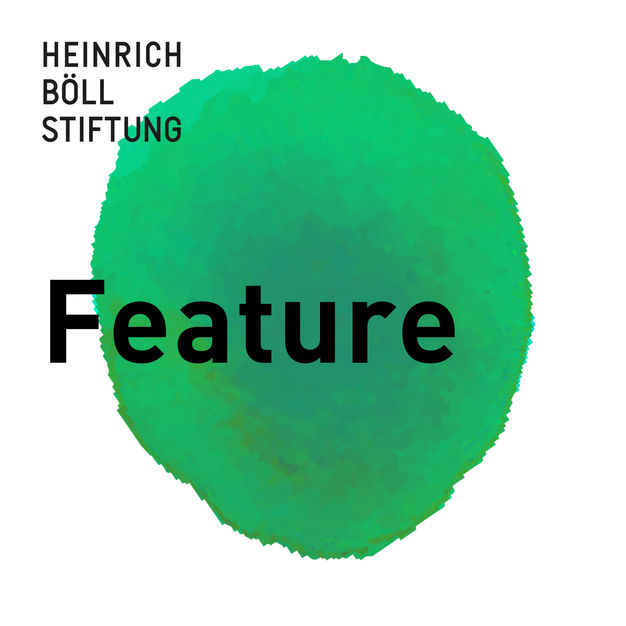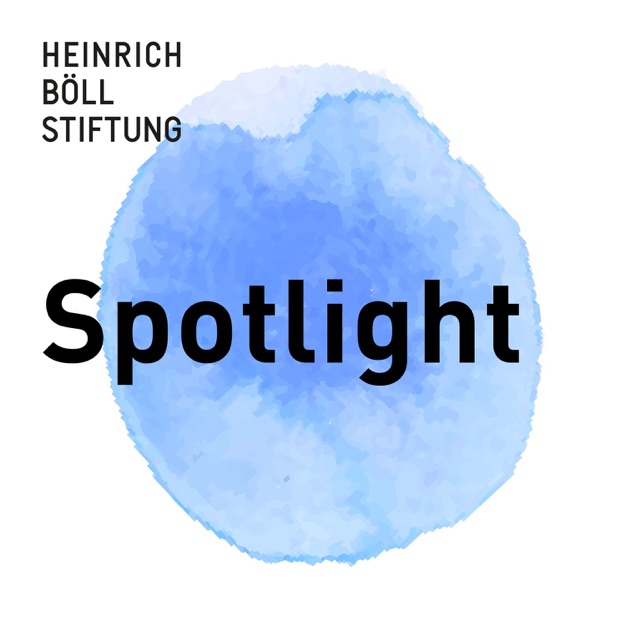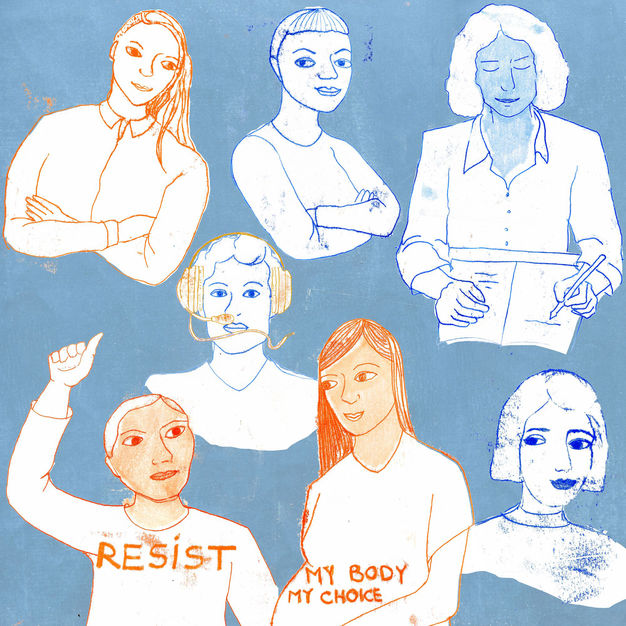
Böll.Feature
The english podcast of the Heinrich-Böll-Foundation.
- 25 minutes 54 secondsSilent Spring (3/3): What are the prospects for pesticide policy?
If we look at biodiversity loss, time is really running out. Especially the young generation is complaining about this. Why are farmers not adapting quickly enough? And what can be done to mitigate the biodiversity and climate crises that are exacerbated by industrialized agriculture? The agricultural sector in Europe is highly subsidized. But is the money from the Common Agricultural Policy (CAP) being used wisely? Will the European Commission succeed in initiating a trend reversal or is one catastrophe – the war in Ukraine – being played off against the other?
A Podcast with:
• Ariel Brunner - Head of EU Policy „BirdLife Europe“, Brussels, Belgium
• Silvia Bender - State Secretary at the Federal Ministry of Food and Agriculture (BMEL), Berlin, Germany
• Dr. Jörn Wogram - Director of the Pesticides Department of the Federal Environment Agency (UBA), Dessau, Germany
• Bernhard Krüsken - Secretary General of the German Farmers' Association, DBV, Berlin Germany
• Martin Häusling - MdEP Greens, Brussels, Belgium
• Nina Holland - Researcher at Corporate Europe Observatory (CEO), Brussels, Belgium
• Marilda Dhaskali - EU Agriculture & Bioenergy Policy Officer, BirdLife Europe and Central Asia, Brussels, BelgiumShownotes:
Original research; The conducted interviews and original sound recordings come from Europe (Berlin, Brussels and the region of Brandenburg).
Open Letter to the EU Commission on Pesticide Reduction and Farm to Fork (F2F) strategy:
https://www.birdlife.org/wp-content/uploads/2022/03/Joint-open-letter_F…
“Sustainable Use Regulation: https://food.ec.europa.eu/plants/pesticides/sustainable-use-pesticides_…
Study: Federal Environment Agendy (UBA) sees room for improvement to achieve the goals set in the European Green Deal: https://www.umweltbundesamt.de/en/press/pressinformation/eu-regulation-…This podcast is an English adaptation of the German podcast series "Stummer Frühling" published in December 2022.
13 July 2023, 10:10 am - 35 minutes 54 secondsSilent Spring (2/3): Pesticide lobby in times of war
While in summer 2022, the EU Commission presented ambitious plans to reduce pesticide use in Europe, it encounters massive resistance by the pesticide industry and, very recently, the conservative EPP group in Parliament. Even in the (re)approval process of glyphosate, the arguments of the industry seem to impress the authorities. In a clever way, economic arguments are being highlighted, following typical public relations playbooks, in order to prevent binding reduction targets. At the same time, toxicologists are criticizing that still today – despite the scandals around glyphosate in the past – authorities are using studies that do not follow scientific standards and even contradict OECD guidelines. Is all the progress being nullified due to the war in Ukraine?
A Podcast with:
• Nina Holland - Researcher at Corporate Europe Observatory (CEO), Brussels, Belgium
• Peter Clausing - Toxicologist at PAN Germany, Brandenburg, Germany
• Siegfried Knasmüller - PhD. Ao. Univ.- Prof. Mag. Dr. Medical University of Vienna Center for Cancer Research, Vienna, Austria
• Silvia Bender - State Secretary at the Federal Ministry of Food and Agriculture (BMEL), Berlin, GermanyShownotes:
Many years of original research; The conducted interviews and original sound recordings come from Europe (Berlin, Brussels and the region of Brandenburg).
According to the "Farm to Fork Strategy" (as part of the “European Green Deal"), the EU wants to reduce the use of pesticides and their toxicity by 50% by 2030. Here is the proposal from the EU Commission to the Sustainable Use Regulation: https://food.ec.europa.eu/plants/pesticides/sustainable-use-pesticides_…The study by Viennese gene toxicologists examining the methodology of the industrial studies (in German): https://www.global2000.at/sites/global/files/Analyse-Glyphosat-Studien
This podcast is an English adaptation of the German podcast series "Stummer Frühling" published in December 2022.
13 July 2023, 10:05 am - 33 minutes 7 secondsSilent Spring (1/3): Glyphosate reloaded
When the book „Silent Spring“ was published 60 years ago, author Rachel Carson shaped the environmental movement as we now know it. But globally, the use of pesticides is still rising steadily, with devastating impacts on human health and the environment: in Europe biodiversity is declining rapidly. Already ten years ago, the International Agency for Research on Cancer classified glyphosate as probably carcinogenic. Now the European Commission finally wants to act and reduce the use of pesticides by 50 percent until 2030 and reassess the approval of glyphosate. But the pesticide lobby, together with the conservative EEP group in Parliament, is up in arms against binding reduction targets and blames the war in Ukraine to justify the need for high-input agriculture. In this episode, we will learn about pesticide scandals in recent years and how millions of Europeans are raising their voices against toxic pesticides.
The podcast includes interviews with:
• Nina Holland - researcher at Corporate Europe Observatory (CEO), Brussels, Belgium
• Jeffrey Smith - consumer activist and author, Iowa, USA
• John Barton - Corporate Communications Officer at Monsanto (today: Bayer), St. Louis, Missouri, USA
• Dr. Kate Guyton - Senior Toxicologist at the International Agency for Research on Cancer (IARC), Lyon, France
• Christopher Portier - Toxicologist, Switzerland
• Karl Bär – Parliamentarian The Greens, Berlin, Germany
• Veronika Feicht – Umweltinstitut München, Munich, GermanyShownotes:
Many years of original research; The conducted interviews and original sound recordings come from Europe and the USA.
Study: “Loud lobby for a silent spring” by Corporate Europe Observatory (CEO): https://corporateeurope.org/en/2022/03/loud-lobby-silent-spring
Study: „Nature’s Dangerous Decline ‘Unprecedented’; Species Extinction Rates ‘Accelerating’” by the Intergovernmental Science-Policy Platform on Biodiversity and Ecosystem Services (IPBES): https://ipbes.net/news/Media-Release-Global-Assessment
Study: „Assessment Report on Pollinators, Pollination and Food Production“ by the Intergovernmental Science-Policy Platform on Biodiversity and Ecosystem Services (IPBES): https://ipbes.net/assessment-reports/pollinators
New York Times article: „Attack of the „Super Weeds“: https://www.nytimes.com/2021/08/18/magazine/superweeds-monsanto.html
Evaluation Study: „The Carcinogenicity of Glyphosate“ by Kate Guyton, International Agency for Research on Cancer (IARC): https://www.europarl.europa.eu/cmsdata/129121/PH%20Glyphosate_Guyton.pdfThis podcast is an English adaptation of the German podcast series "Stummer Frühling" published in December 2022.
13 July 2023, 10:00 am - 17 minutes 4 seconds50 Years of ASEAN (3/3): Sustainable Transport and Emissions
Everyone who has ever been to one of the Southeast Asian urban centers knows that traffic is a big problem. It is a problem for life quality of the city citizens as the endless traffic jams are health hazards and time consuming. Beyond this, transportation also cause emissions that contribute to climate change. However, solutions to free the streets from cars are yet to be implemented.
By Johanna Son
Johanna Son, a Filipino journalist/editor based in Bangkok for 17 years, follows a mix of regional issues, including ASEAN. She also works on programs around the capacity-building of journalists from Asia.Picture: Ines Meier/Lizenz: cc-by-nc-nd
10 August 2017, 7:07 am - 17 minutes 18 seconds50 Years of ASEAN (1/3): Taking stock of ASEAN´s vision of development
Where are ecological concerns in the ASEAN development paradigm? They are stuck in the word “sustainable”. Despite the haze agreement and protocols on maritime policies, ASEAN has fallen short of reacting to climate change.
Despite international commitments as the Paris Agreement, it does not manage to put words into regional action. As long as limits of growth are not integrated into the overall ASEAN vision, single projects like saving orang-utans will lead nowhere but deeper into the ecological crisis.
By Johanna Son
Johanna Son, a Filipino journalist/editor based in Bangkok for 17 years, follows a mix of regional issues, including ASEAN. She also works on programs around the capacity-building of journalists from Asia.Bild: Ines Meier/Lizenz: cc-by-nc-nd
25 July 2017, 7:07 am - 16 minutes 21 seconds50 Years of ASEAN (2/3): All clear on the Haze?
The haze agreement is the first agreement in ASEAN on an explicit environmental issue. It has entered into force 2003 in order to manage forest fires and reduce environmental destruction as well as air pollution with joint regional efforts.
However, in 2015 Singaporean citizens saw themselves confronted with a major haze, zero visibility and a thick smoke smell coming over from Indonesia. Today, the struggle between environmental, regional foreign and economic policy has still not been decided despite these immediate consequences.
By Johanna Son
Johanna Son, a Filipino journalist/editor based in Bangkok for 17 years, follows a mix of regional issues, including ASEAN. She also works on programs around the capacity-building of journalists from Asia.Bild: Ines Meier/Lizenz: cc-by-nc-nd
25 July 2017, 7:07 am - 25 minutes 11 secondsTipping Point (5/5): The great transition - Alternative paths for a better and climate just future
The Paris Agreement has set an ambitious goal to prevent global warming from spiraling out of control. But it has also set the stage for what will form the subject of numerous heated debates in the coming years: How do we tackle climate change? What is the framework that helps us decide which solution is viable? In this podcast series, we’ve looked at different strategies that have been proposed – some of which are speculative, risky, heavy with side-effects, others which look more attainable. In this last episode, we will zoom out and take a broader look at the transformation ahead. Climate change is a unique challenge. Each and every sector of the economy will have to change. Tackling the issue will require a fundamental shift in how we as humans interact with nature and our planet. Do we need a masterplan to get there? Maybe not. Because at this moment, many activists, scientists and entrepreneurs are already active, experimenting with models and ideas for a more sustainable and more equitable world. It’s a diverse set of approaches based on diverging cultural backgrounds that share acommon vision – to find ways for a livable and climate just future.
Photo CC-0: Igor Ovsyannykov / Unsplash.com
11 May 2017, 7:07 am - 21 minutes 36 secondsTipping Point (4/5): Precious Soils and Seeds - Industrial agriculture and climate smart farming
The food that we eat plays a big role in the search for solutions to climate change. Agriculture is one of the major contributors of greenhouse gases. But the way we farm our land can also be a big part of the solution. In fact, certain kinds of soil are huge carbon sinks, which means that they take up carbon dioxide from the atmosphere. In this way, healthy soil can regulate the climate. The kinds of crops we plant play another crucial role. They can help us adapt to changes in the climate that we cannot prevent. If we farm diverse crops instead of monocultures, this makes us more resilient. In this episode, we discuss the impacts of industrial agriculture and alternatives concepts like agro-ecology with Teresa Anderson from Action Aid and Mariann Bassey from Friends of the Earth Nigeria. As it turns out, the way farmers nurture their crops can make a huge difference for people and the planet.
Foto CC-0 Stephen Radford / Unsplash.com
5 May 2017, 7:07 am - 25 minutes 22 secondsTipping Point (3/5): License to pollute - Carbon markets and the new economy of nature
We start to count as little kids. First our fingers, then our toys, and finally more grown-up things – calories, money, trophies. As a society, we now count our wealth and the CO2 that we emit. If you can quantify something by counting it, you can turn it into a market – right? That’s what countries around the world have tried by setting up emission trading systems. These new markets aim to put a price on carbon, to save emissions where it is cheapest and benefit the global climate. But the approach has failed so far. In the EU, the price for carbon has dropped to a low, so producers can easily continue polluting. And they are actually making huge profits from the permits they receive. Carbon credits are another way for polluters to buy themself out of responsibility. These offsets are often produced in poorer countries, in forests for example. By turning nature into a commodity, indigenous people are often forced to leave or change their traditional ways of life. In this episode, we discuss the side-effects of our new carbon economy with biologist Jutta Kill from Germany and Ivonne Yanez from Acción Ecológica in Ecuador.
Photo: CC-0, pixabay.com
12 April 2017, 7:07 am - 24 minutes 47 secondsTipping Point (2/5): Climate Justice - Can the courts solve the climate crisis?
In Germany, a Peruvian smallholder farmer and mountain guide is suing a big energy company over a melting glacier that threatens his valley. In the Netherlands, citizens have won a lawsuit in the first instance to pressure their government into guaranteeing stronger climate protection. In the Philippines, the Commission on Human Rights is investigating the fossil-fuel industry. Can governments and industry be put on trial in climate cases, to ensure the rights of the most vulnerable and future generations? The livelihoods of hundreds of millions could be threatened by unprecedented storms, droughts, floods, and sea-level rise. While having contributed little to the problem, they will be the hardest hit. In the political arena, the discussion around climate-related losses and damages has revolved mostly around financial support. But the underlying justice issues remain unsolved. So now, advocates around the world are spearheading lawsuits to protect the climate and those affected. In this episode, we explore the new movement with two experts in climate litigation, lawyers Tessa Khan and Roda Verheyen.
Photo: CC BY 2.0 Dan4th Nicholas / Flickr
30 March 2017, 7:07 am - 27 minutes 6 secondsTipping Point (1/5): Climate geoengineering – Experimenting with the global thermostat
Can and should the global climate be regulated by technological means, the so called geoengineering? Our host took off to hear from experts what these approaches mean for the planet’s environment and society.
Kann und sollte das Weltklima technisch mit so genanntem Geoengineering gesteuert werden? Unser Host erfährt von Experten/innen etwas über Auswirkungen dieser Versuche auf die Menschen und die Umwelt unseres Planeten.
Photo CC-0: Eugene Triguba / Unsplash.com
16 March 2017, 7:07 am - More Episodes? Get the App
Your feedback is valuable to us. Should you encounter any bugs, glitches, lack of functionality or other problems, please email us on [email protected] or join Moon.FM Telegram Group where you can talk directly to the dev team who are happy to answer any queries.
 Bionic Planet: Reversing Climate Change by Restoring Nature
Bionic Planet: Reversing Climate Change by Restoring Nature
 GreenMe Podcast | Meet the Heroes of the Urban Green Scene
GreenMe Podcast | Meet the Heroes of the Urban Green Scene
 Böll.Spotlight (english)
Böll.Spotlight (english)
 Our Voices, Our Choices (deutsch)
Our Voices, Our Choices (deutsch)
 Green Radio
Green Radio
 Fokus Europa
Fokus Europa